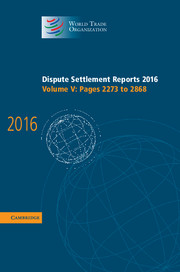Book contents
- Frontmatter
- Contents
- United States - Anti-Dumping and Countervailing Measures on Large Residential Washers from Korea (WT/DS464): Report of the Appellate Body
- United States - Anti-Dumping and Countervailing Measures on Large Residential Washers from Korea (WT/DS464): Report of the Panel
- Cumulative List of Published Disputes
United States - Anti-Dumping and Countervailing Measures on Large Residential Washers from Korea (WT/DS464): Report of the Appellate Body
Published online by Cambridge University Press: 24 July 2020
- Frontmatter
- Contents
- United States - Anti-Dumping and Countervailing Measures on Large Residential Washers from Korea (WT/DS464): Report of the Appellate Body
- United States - Anti-Dumping and Countervailing Measures on Large Residential Washers from Korea (WT/DS464): Report of the Panel
- Cumulative List of Published Disputes
Summary
INTRODUCTION
The United States and Korea each appeals certain issues of law and legal interpretations developed in the Panel Report, United States – Anti-Dumping and Countervailing Measures on Large Residential Washers from Korea (Panel Report). The Panel was established on 22 January 2014 to consider a complaint by Korea with respect to the consistency of the United States' measures imposing definitive anti-dumping and countervailing duties on imports of large residential washers (LRWs) from Korea with the Agreement on Implementation of Article VI of the General Agreement on Tariffs and Trade 1994 (Anti-Dumping Agreement), the Agreement on Subsidies and Countervailing Measures (SCM Agreement), and the General Agreement on Tariffs and Trade 1994 (GATT 1994).
On 3 September 2014, after consultations with the parties, the Panel adopted additional working procedures for the protection of business confidential information (BCI Procedures). On 12 December 2014, the Panel rejected China's request for enhanced third party rights. On 13 February 2015, the Panel also rejected the European Union's request to amend certain aspects of its working procedures and found that there was no need to modify its BCI Procedures in light of the “reservations” raised by the European Union.
With regard to the United States’ measures imposing definitive antidumping duties on imports of LRWs from Korea, Korea challenged before the Panel certain aspects of the methodologies used by the United States Department of Commerce (USDOC) to determine whether to apply the weighted average-to transaction (W-T) comparison methodology. Specifically, Korea challenged: (i) the so-called “Nails II methodology” used in the anti-dumping investigation conducted by the USDOC concerning imports of LRWs from Korea (Washers anti-dumping investigation); (ii) the so-called “Differential Pricing Methodology” that replaced the Nails II methodology as of March 2013 (DPM) “as such“; (iii) the DPM “as applied” in the first administrative review of the anti-dumping order imposing anti-dumping duties on LRWs from Korea issued by the USDOC on 15 February 2013 (Washers anti-dumping order); and (iv) the ongoing and future application of the DPM in connection with the Washers anti-dumping investigation. Korea also challenged the USDOC's use of “zeroing” in the context of the W-T comparison methodology. Specifically, Korea challenged: (i) “as such” the rule or norm pursuant to which the USDOC engages in zeroing; and (ii) zeroing “as applied” in the Washers anti-dumping investigation.
- Type
- Chapter
- Information
- Dispute Settlement Reports 2016Volume V: Pages 2273-2868, pp. 2275 - 2504Publisher: Cambridge University PressPrint publication year: 2017

